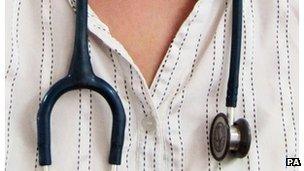The changing NHS
- Published

The health services in Scotland, Wales and Northern Ireland are also coming under pressure
Much of the attention in the past two years in terms of the NHS has been focused on what is happening in England.
The government's reforms have dominated the headlines. But elsewhere in the UK the service is having to adapt to the changing needs and demands of modern health care.
So what are the challenges in Scotland, Wales and Northern Ireland and how are they being met?
Scotland
The NHS in Scotland is spending money on new technologies and treatments but it's not spending money on root-and-branch reform, writes Eleanor Bradford.
The health service in Scotland is run by large regional health authorities in a system that would now seem very old fashioned in other parts of the UK.
The stability of this arrangement helps health authorities spend more money on front-line care, but they are also helped by the fact that Scotland chooses to spend a higher proportion of its income on the NHS. The downside is that there is little choice for patients - you are stuck with your local hospital: good or bad.
Scotland is reforming the system of social care for the elderly and disabled. It is the only part of the UK where the elderly can get help with washing, toileting and dressing for free under a policy called 'free personal care'.
However, the cost of this has more than doubled since it was introduced a decade ago.
Health and social care budgets are also being merged. The aim is to end the kind of delays which keep people in hospital while they wait for councils to arrange home care.
There is also a more radical plan in the pipeline to give people the money for their own care so that they can buy what they want rather than what the state says they should have.
Wales
Wales has a strong claim to be the birthplace of the NHS, writes Owain Clarke.
Drawing up plans for a universal health service in 1948 - Aneurin Bevan drew inspiration from a scheme in his home-town of Tredegar - where groups of workers came together to buy medical care for themselves and their families.
A stone's throw away today stands one of Wales' newest hospitals - the first to offer a single room and bathroom to every patient. But it serves one of the country's poorest communities with life expectancy well below the Welsh average.
And it is partly to try to tackle those inequalities that all seven health boards in Wales, on the instruction of the Welsh government, are changing the way they deliver care - with a bigger emphasis, as in Scotland, on public health and care at home.
In response to a Wales-wide shortage of doctors - they also want to centralise specialist services in fewer large hospitals - although there is big opposition in many areas over a fear local hospitals will be downgraded
And another reality - the NHS in Wales needs to find more savings than it has ever done before - and all Welsh health boards are millions of pounds behind their annual targets to balance their books.
But, unlike in England, change will not be about choice and competition.
Health boards will still be responsible for funding services and delivering them.
And in that respect, the Welsh government argues, it is sticking to a model of the NHS that its architect would be able to recognise.
Northern Ireland
Like Wales, the health service in Northern Ireland is having to cope with the impact of excess smoking, drinking and eating, writes Marie-Louise Connolly.
Traditionally those patients would be treated in hospital, but now the plan is to shift care away from that traditional setting and instead to health centres in the heart of the community.
It is hoped those centres will become the hub for treating patients suffering from diabetes for instance and even certain cardiac patients where the consultant will be expected to travel to them.
These plans which are being put out to consultation next month are part of the Department of Health's policy for transforming Northern Ireland's health service - the biggest shake-up in care for decades.
Take, for example, a recovering stroke patient. That new system would allow all health professionals - from consultant, district nurse to speech therapists - to meet under one roof and plan a patient's aftercare together.
The British Medical Association says while it welcomes the changes, it is concerned about where the money is coming from to fund the building of the extra health centres.
With government coffers low, it's thought private finance initiative will have to be employed. There is also concern whether enough nursing staff will be transferred to the community and if enough time will be allowed for staff to travel and treat patients at home.
But to make all this happen the local assembly needs more cash. That could come from cutting the number of acute hospitals from 10 to five. Hardly a vote winner for politicians here or in the rest of the UK.
- Published27 September 2012